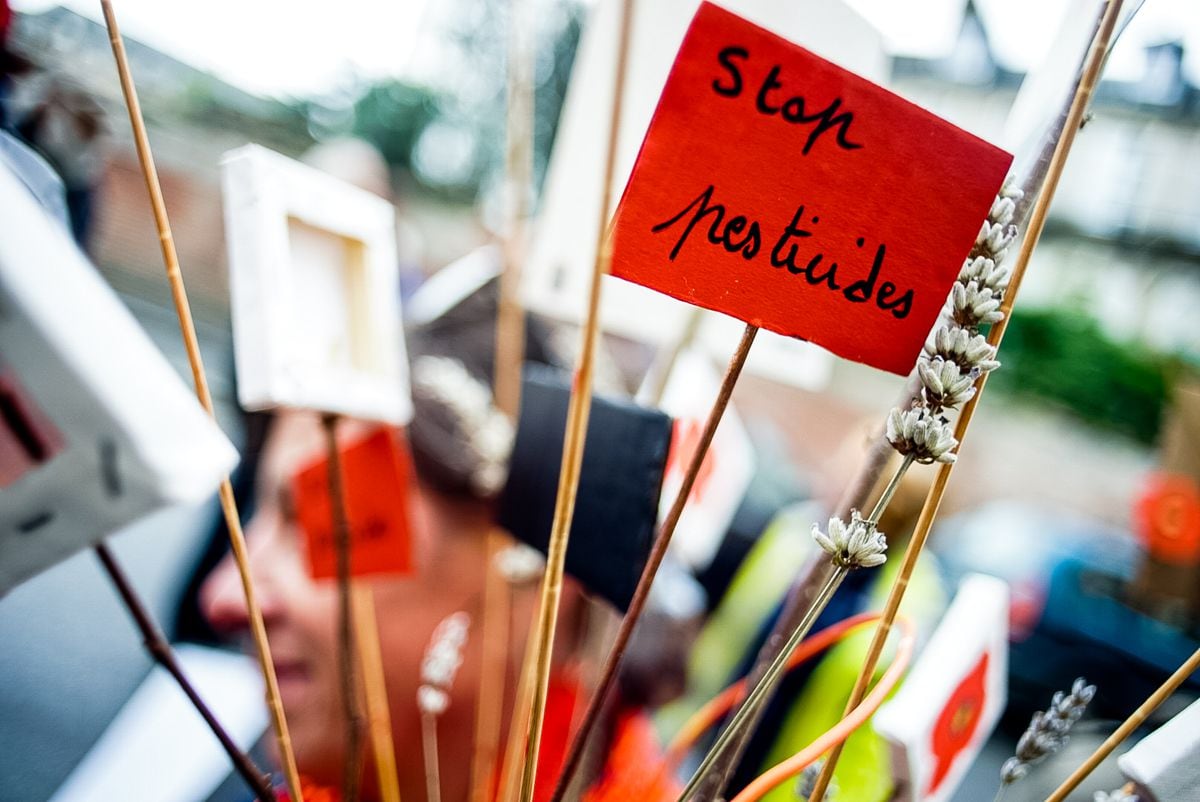Shows of support for Mayor Daniel Cueff sued by the French administration over his anti-pesticide policy in Rennes, France, on October 14, 2019.Vernault Quentin (NurPhoto/Getty Images)
The strong division caused in the EU by glyphosate, the most widely used herbicide in Europe but, at the same time, one of the most controversial, has been highlighted this Friday in Brussels, where the necessary qualified majority of the Twenty-seven has not been achieved neither to approve nor reject the prolongation of the use of this substance for 10 more years, as proposed by the European Commission.
In view of the status quo, the European executive has decided to postpone the new vote until mid-November. Brussels wants a decision — which can ultimately be said by the EU executive itself if an agreement is still missing — before Dec. 15, when the current permit expires.
As confirmed by the Commission, the Standing Committee on Plants, Animals, Food and Feed (Scopaff), which assists the Commission in the preparation of food-related measures and in which all Member States are represented, failed to gather at its meeting on Friday a qualified majority (of 55% of EU members representing at least 65% of the total population of the bloc) or to approve or to reject the proposal. While Spain expressed itself in favor of renewing its use, other countries of great weight, including Germany and France – where there has been a strong citizen mobilization against glyphosate in recent years – abstained, which for the purposes of the count is considered a vote against.
Given the situation, Brussels has decided to refer the matter to the Appeal Committee, which must vote on the initiative "in the first half of November". If again this committee fails to unlock the vote, it will ultimately be the Commission that decides, a spokesman said Friday.
Speaking to Agence France Presse, French Agriculture Minister Marc Fesneau justified Paris' "From the outset we have said that the Commission's proposal, as formulated, does not correspond to the [French] trajectory of restricting its use where there are alternatives to achieve less glyphosate." Explained. France, which is the EU's top agricultural power, wants there to be a "harmonisation at European level" of this position to avoid unfair competition, he added.
On the contrary, Spain has declared itself in favor of its extension, considering that "the scientific information and the evaluation reports carried out by the European Food Safety Authority (EFSA) clear the existing doubts about the safety of this active material", according to sources of Agriculture.
The president of the Environment Committee of the European Parliament, also French Pascal Canfin, celebrated in X (former Twitter) the lack of majority in favor of authorizing glyphosate for another 10 years "without restrictions of use" and called on the president of the European Commission, Ursula von der Leyen, to "modify this unacceptable proposal".
But, although Brussels says it is open to "discussions", it maintains that the proposal sent to the Twenty-seven already contains the necessary "restrictions and conditions" and considers it a "good proposal".
"For now, and taking into account that the European Food Safety Authority (EFSA) and many colleagues from different countries have analyzed mountains of scientific reports and studies, we believe we have a good proposal," the spokesman stressed.
The discussion about the use of glyphosate dates back to 2015
During a debate on glyphosate in the plenary session of the European Parliament in Strasbourg last week, the Commissioner for Food Safety, Stella Kyriakides, had recognized the division of the Twenty-seven, but recalled that even if the renewal of the authorization goes ahead, "Member States will have the possibility to restrict the use of soil protection products, including glyphosate, at the national or regional level, if they deem it necessary to protect biodiversity."
In March 2015, the World Health Organization's International Agency for Research on Cancer classified glyphosate as "probably carcinogenic to humans," a category that also includes red meat. But the European authorities reject this opinion. Last year, the European Chemicals Agency's (ECHA) risk assessment committee refused to change the current classification of glyphosate — which is considered to cause "eye damage" and "toxic to aquatic life" — but, it stressed, not carcinogenic. "Based on an extensive review of the scientific evidence, the committee again concludes that classifying glyphosate as carcinogenic is not warranted," the agency said in a statement.
The various assessments of the scientific community on the risks that glyphosate can pose to health and biodiversity have led to intense social debate and a strong mobilization of citizens in many parts of the world. In Europe, the citizens' initiative Stop Glyphosate managed to gather in 2017 more than one million signatures necessary for the European Commission – whose team was renewed two years later, after the European elections of 2019 – to take into account their arguments. On the eve of Friday's decision, another citizen protest movement has added more than half a million signatures in France to reject the extension of the herbicide's permit.
The Alliance for Health and the Environment (HEAL), which rejects the prolongation of glyphosate, stressed after the failure of the first vote that this "shows that it has become politically impossible to ignore the science about the health impact of this substance." The postponement of the vote, said its director of the Health and Chemicals program, Natacha Cingotti, gives "member states a new opportunity to protect current and new generations from preventable harm by banning glyphosate as soon as possible."
You can follow CLIMA Y MEDIO AMBIENTE on Facebook and X, or sign up here to receive our weekly newsletter

